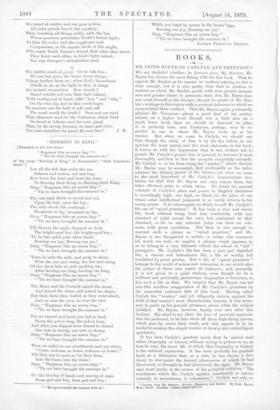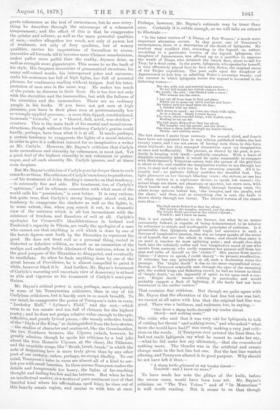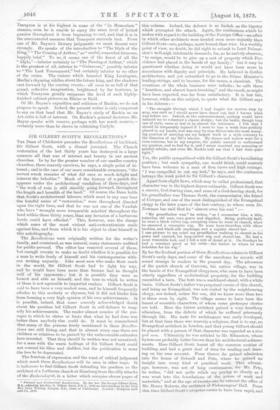BOOKS.
MR. PETER BAYNE ON CARLYLE AND TENNYSON. Wn are doubtful whether, in Lee8on8 from, My Alfaetolv, Mr. Bayne has chosen the most fitting title for this book. That he regards Mr. Raskin as his master in matters relating to Art is clear enough, but it is also pretty clear that in relation to matters on which Mr. Ruskin speaks with even greater earnest- ness and greater desire to persuade, than Art, Mr. Bayne does not count himself as his disciple, though he speaks of Mr. Rue- kin's writings in this region with a reverent deference to which we- cannot think them entitled. That Mr. Bayne, again, profoundly admires Mr. Tennyson—places a good deal of his poetry, indeed, on a higher level, though not a little also on a much lower level, than we should be disposed to place- it—is perfectly true; and Tennyson, perhaps, may be re- garded as one to whom Mr. Bayne looks up as his master. But when we come to Carlyle, we should say that though the study of him is by far the ablest, in our opinion the most useful, and the most elaborate, in the book, it leaves us with the impression that it was written not to. preach Mr. Carlyle's gospel, but, in general, to traverse it most thoroughly, and that in this the essayist completely succeeds. Mr. Carlyle is so far from being the " master " whose disciple Mr. Bayne may be accounted, that profoundly as the latter admires the literary power of the former, yet when we come• to the most important of Mr. Carlyle's characteristic doc- trines, we find that Mr. Bayne not only rejects them, but takes effectual pains to refute them. No doubt his general estimate of Carlyle's place and power in English literature is exceedingly high,--too high, we think, for the place of one- whose sober intellectual judgment is so vastly inferior to his seeing power. It is extravagant, we think, to call Mr. Carlyle's life one of " epical grandeur." It has been a wise and serene life, lived without being bent into conformity with any standard of right except his own, but conformed to that standard, so far as any external judge can form an esti- mate, with great resolution. But that is not enough to warrant such a phrase as " epical grandeur," and Mr. Bayne is too thoughtful a writer,—a writer who measures his words too well,—to employ a phrase which appears to. us to .belong to a very different school, the school of "tall " panegyric. Mr. Carlyle's life has been a just and dignified life, a sincere and, industrious life, a life of worthy toil irradiated by great genius. But a life of " epical grandeur" belongs to the world of action and enterprise, is one which stirs the pulses of those who watch its fortunes ; and assuredly it is not given to a quiet student, even though he be a brilliant and spiritually picturesque biographer or historian, to live such a life as that. We suspect that Mr. Bayne was led into this needless exaggeration of Mr. Carlyle's greatness by the somewhat awkward title of this book. Having called
Carlyle his "master," and yet diligently striven against the drift of that master's most characteristic lessons, it was neces- sary to paint up his general greatness above what the subject justified. Mr. Bayne, however, hardly ever errs after this fashion. His mind is too clear, his love of accurate apprecia- tion too profound, to let him shoot a these high-flying arrows, which pass far above their mark, and only appear to be in- tended to awaken the stupid wonder of drowsy and unintelligent spectators.
It has been Carlyle's greatest merit that he cannot read either biography or history without trying to picture to us, as best he may, the inner life of which that biography or history is the outward expression. It has been probably his greatest fault as a delineator that, as a rule, he has shown a ten- dency to over-paint the inward phenomena of which he had discovered, or thought he had discovered; the signs. Mr. Bayne says most justly, in the course of his powerful criticism, "The touchstone which Mr. Carlyle applies, consciously or uncon- sciously, to earnestness, is vehemence." Carlyle not only re-
* LOSSOPII from My Madera: Carlyle, Ilmnbson, and Raskin. By Peter Bayne, LL.D. London ; James ()hake and Co.
gards vehemence as the test of earnestness, but he sees every- Perhaps, however, Mr. Bayne's estimate may be truer than thing he describes through the microscope of a vehement ours. Certainly it is subtle enough, as we will take an extract temperament ; and the effect of this is that he exaggerates to illustrate :—
the quieter and soberer, as well as the more powerful qualities "In the latter version of 'A Dream of Fair Women,' a much more of mono—makes altogether too much, not only of power, but important alteration occurs. In that poem, ono of Tennyson's of weakness, not only of fiery qualities, but of watery masterpieces, there is a description of the death of Iphigenia. My readers may recollect that, according to the legend, or, rather, qualities, carries his imputations of formalism to excess, according to a particular version of the legend, Iphigenia, the travesties all formula till it becomes mere Chinese rnandarinism, daughter of Agamemnon, was offered up as a sacrifice to appease makes pallor more pallid than the reality, dryness drier, aa the wrath of Diana, who detained the Greek fleet, about to sail for well a strength more gigantesque. This seems to us the fault of Troy, by a dead calm. in the poem, Iphigenia, who speaks for herself, s is very effectively placed face to face with Helen, the original cause his style. His frequent inversions of grammatical structure, his of the Trojan expedition. The poet calls upon the daughter of many self-coined words, his interspersed jokes and sarcasms, Agamemnon to join him in admiring Helen's sovereign beauty, and make his sentences too full of high lights, too full of accented the manner in which Iphigenia meets the appeal is recorded in the- phrases, for continuous reading without fatigue. And his inter- pretation of men errs in the same way. He makes too much But she, with sick and scornful looks averse, of the points he discerns in their lives. He is too free not only . My youth,' shesaid, ' was blasted with a curse: with the eternities and the immensities, but with the failures of This woman was the cause.
the eternities and the immensities. There are no ordinary Which yet to name my spirit loathes and fears : people in his books. If you have not got men at high ro blinded with my tears, pressure, you have in their place men at preternaturally low Still strove to speak : my voice was thick with sighs, or wrongly-applied pressure,—a mere thin-lipped, constitutional, The stern, black-bearded kings, with wolfish eyes, incarnate "formula," or a "bleared, dull, acrid, woe-stricken" Waiting to see Ille die.
creature. This is the main fault of his mental and moral recon- • The temples, and the people, and the shore ; structions, though without this tendency Carlyle's genius could Slowly—and nothing more.' hardly, perhaps, have been what it is at all. It needs, perhaps, The last stanza I quote from memory. Its second, third, and fourth a certain tendency to exaggerate the lights of a moral interior, lines have not appeared thus in any edition published within the last in order to give it a sufficient interest for so imaginative a writer twenty years, and I am not aware of having seen them in this form as Mr. Carlyle. However, Mr. Bayne's criticism that Carlyle since boyhood ; but they stamped themselves upon my imagination at once and ineffaceably. The picture as drawn by the poet, is per. tests earnestness and sincerity by vehemence, is most just. Yet fectly in keeping with itself,—perfect'ly complete. With a force of a good deal of the highest sincerity is not vehement or pietur- dramatic sympathy which it would be quite reasonable to compare- esque, and all such sincerity Mr. Carlyle ignores, and at times with Shakespeare's, Tennyson enters into the person of the girl that even despises. eyes, to gasp and sigh with her in her swooning anguish. All is in- But Mr. Bayne's criticism of Carlyle goes far deeper than to such tensely real ; no pathetic fallacy modifies the dreadful fact. The- remarks as these. His criticism of Carlyle' s tendency to pantheism, light glimmers on her through blinding tours ; she strives, as one has —of his treatment of John Sterling's remarks on that tendency, so often striven in a nightmare dream, to speak, but cannot; the actual kings are there, not phantoms or spectres, but stern men, with —is extremely fine and. able. His treatment, too, of Carlyle's black beards and wolfish eyes. Dimly, through burning tears, the optimism," and its ultimate connection with what most of the whole scone quivers before her, 'the temples, and the peolilo, and world calls his "pessimism," is even better. It is very curious, the shore,' and then, real as everything oleo is real, the knife is true, that Carlyle's strong language about evil, his but quite drawn slowly through her throat. The altered version of the stanza tendency to exaggerate the shadows as well as the lights, is, to some extent, due, when yolk search it out, to a dramatic The crowds, the temples, wavered, and the shore; view of the universe which is all but inconsistent with the Toueled; and I know no more.
who cannot see that anything is evil which is done by one of in some of his Tennysonian criticisms, than in any of his Coorlylean criticisms, but is hardly seen in so much breadth. To
seem to us too ornate and too full of rhetoric for the highest "One drew a sharp knife through my tender throat Poetry; and he does not assign relative value enough to the epic, Slowly—and nothing more."
felt you with small beauties. In these poems Tennyson makes the "A sharp knife glittered at my tender throat— details and foregrounds too heavy, the lights of far-reaching Touched—and I knew no more."
:— following verses
To her full height her stately stature draws ; I was cut off from hope in that sad place, My father held his hand upon his face ; As in a dream. Dimly I could descry The tall masts flieker'd as they lay afloat,
One drew a sharp knife through my tender throat,
is about to dio, and enables the imaginative reader to see through her runs thus :—
The high masts flicker'd as they lay afloat ;
The bright death quivered at the victim's throat ; existence of freedom, and therefore of evil at all. Carlyle's This is not merely inferior to the former, but what by no means apologies for Cromwell's bloodthirstiness in Ireland and necessarily follows, is capable of being demonstrated to be inferior Frederick's rapacity in Silesia, are really the apologies of a man by reference to simple and irrefragablo principles of criticism. Is it
permissible that Iphigenia should begin her narrative in such a- fervour of imaginative passion, that she no longer speaks of the scene
the heroic figures sent forth by the Eternities to represent the or of herself, but sees the whole in vision; and should thus carry it good. He does not treat evil as a personal thing, rooted in on until it roadies its most agitating point; and should then sink distorted or defective volition, so much as an emanation of the back into the infinitely colder and less imaginative mood of one who malign and radically feeble Ahriman of the universe, whom it is speaks from memory, who coolly separates her present self from her-
past and talks of herself as the 'victim I" She passes from poetic-
the good purpose of the Eternities to disappoint, and eventually vision—' I strove to speak, I could descry '—to prosaic recollection. to annihilate. So when he finds anything done by one of the If criticism has any principles at all, such a declension ruins the- great heroes of Providence, he is almost compelled to paint it passage. The 'bright death ' is due to the same unparalleled error. white, however black it is. And further, Mr. Bayne's treatment Seeing, as Tennyson originally saw, through the oyes of the swooning-
girl, the wolfish kings and flickering crowd, be had no leisure to think
of Carlyle's wavering and uncertain view of democracy is atleast of 'bright death," no idle ingenuity of spirit to hit upon such a con- as able and vigorous as his treatment of Carlyle's semi-pan- ceit. 'Bright death' means nothing in particular, and would theism, probably suggest a flash of lightning, if the knife had not been Mr. Bayne's critical power is seen, perhaps, more adequately mentioned in the earlier version."
That contains fine criticism. But though we quite agree with Mr. Bayne that the alteration of the last line but one was bad,
our mind, he exaggerates the power of Tennyson's tales in verse, we cannot at all agree with him that the original last line was. " Locksley Hall," " Aylmer's Field," and the rest,—which good. There was a baldness, and rudeness, too, in saying,— reflective, and purely lyrical pieces,—the merely reflective books The critic who said that it was very odd for Iphigenia to talk of the "Idyls of the King," as distinguished from the love-stories, of cutting her throat" and nothing more," and who asked" what —the studies of character and sentiment, like the Grandmother, more she would have had P" was surely making a very just criti. the two Northern farmers, the Ulysses (which, however, he cism on the words. If Tennyson ever printed the lines thus, he greatly admires, though he spoils his criticism by a bad joke had not made Iphigenia say what he meant to make her say, about the true Homeric Ulysses, at the close), the Tithonus, —what be did make her say ultimately,—that she remembered and the exquisite songs, like "Break, break, break," in which the nothing more. The blunder was in the artificial and ornate note of despairinglove is more truly given than by any other change made in the last line but one. But the last line wanted poet of our century, unless, perhaps, we except Shelley. To our altering, and Tennyson altered it to good purpose. Why should mind, Tennyson's tales in verse are almost all of a kind to sur- he not have left it thus,— thought and feeling too few and far between. But when he has To have made her note the glitter of the knife, before an intellectual motive, or a motive of pure sentiment (not of that the swoon came, would have been true art. Mr. Bayne's fanciful kind where his affectations spoil him), he rises out of criticism on "The Two Voices" and of "In Memoriam " this heavily ornate region, and carries us with him at once. is well worth reading. But it seems to us that though Tennyson is at his highest in some of the " ]-u Memoriam" stanzas, even he is unable to carry the same level of lyrical passion throughout it from beginning to end, and that it is in -the concentrated essences that Tennyson su.cceeds best. From one of Mr. Bayne's literary judgments we must dissent very strongly. He speaks of the introduction to "The Idyls of the King," "The Coming of Arthur," as" useful, somewhat tiresome, happily brief." To us, it seems one of the finest of all the " ldyls,"—inferior certainly to "The Passing of Arthur," which is the greatest of all, inferior to "Guinevere," possibly inferior -to "The Last Tournament," but certainly inferior to no other of the series. The visions which haunted King Leodogran, Merlin's rhyming riddles about the future king, and the shadows cast forward by the coming events,—all seem to us full of that grand, reflective imagination, brightened by far horizons, in which Tennyson greatly surpasses the level of such highly. finished cabinet-pictures as Elaine or Enid.
Of Mr. Bayne's exposition and criticism of Ruskin, we do not propose to speak. Indeed, the present writer is only competent to say on that head that Mr. Bayne's study of Ruskin as an Art critic is full of interest. On Ruskin's general doctrines Mr. Bayne speaks with reserve, perhaps with too much reserve,— certainly more than, he shows in criticising Carlyle.




































 Previous page
Previous page